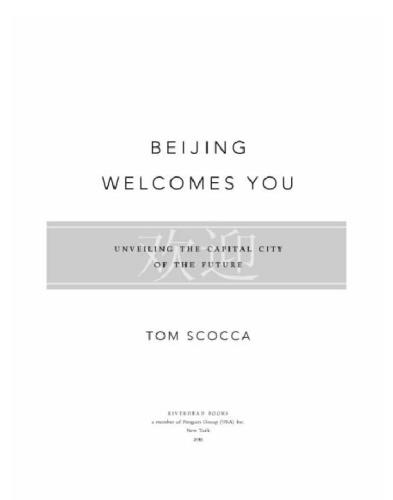
Beijing Welcomes You
Unveiling the Capital City of the Future
کتاب های مرتبط
- اطلاعات
- نقد و بررسی
- دیدگاه کاربران
نقد و بررسی

March 21, 2011
Scocca, "Off the Record" columnist for the New York Observer, offers a timely chronicle of China's transformation through an eyewitness account of how Beijing refurbished itself for the 2008 Olympics. From 2004 to 2010, Scocca records how the measures China took to present its best face to the world, restricting public spitting, banning the sale of knives in light of a stabbing, and winning 51 gold medals in the games themselves. He excels at straddling the line between the personal and sociopolitical: he marks the birth of his son and celebrating Christmas in the capital as larger changes in consumption and national identity sweep China. These personal touches are welcome reprieves in a text often inundated with sociological detail. The dizzying descriptions of the ringed layout of Beijing or the denizens of his apartment's alleyway are often difficult to keep track of, especially when laced together with the country's athletic preparation, architectural feats, and even attempts at controlling the weather. But in destabilizing the reader, the welter of sensory data and anecdote allows sharing in the author's bewilderment as Beijing constantly reimagines and reshapes itself.

May 15, 2011
A curiously backward-moving but fun book chronicling the buildup to the Beijing Olympics.
A columnist at the time for the New York Observer, Slate blogger Scocca and his Chinese American wife moved to Beijing in 2004 (she worked in nonprofit, he commuted back and forth from New York). For the next four years, by the magic date of 8/8/08, they witnessed the extraordinary transformation of the city into a marvel for the world. A once closed-off, cluttered capital city plagued by the rambling hutongs (the old city's lanes and alleys...right-angled jogs and branchings, blind turns and dead ends, parallel lines suddenly swinging perpendicularly away from each other"), traffic jams and smog, Beijing was gradually rearranged, gutted and renovated by enormous, all-devouring construction projects. The single-character chai ("tear down") was painted everywhere. The Stalinist architecture and goofy traditionalist designs were scuttled in favor of the innovative and sculptural: "hatboxes, flashlights, sardine cans standing on end, a giant topiary garden in steel and glass." China would spend $40 billion to prepare for the Games, aiming for a top gold-medal count (only 20 years before, China had won its first gold medal in Los Angeles), hiding its hordes of rustic migrant workers and selecting the Olympic motto "One world, one dream" (Scocca's alternate translation: "Same world, same dream"). Life in Beijing for the foreigners was not always easy or comfortable (such as the manifestation of the security state via Internet censorship), but endlessly fascinating and unintentionally hilarious: the lively, ever-changing taxi fleet, the everyday objects that fell apart effortlessly, the contradictions in the Chinese character, the government's efforts to improve their citizens' manners by prohibiting public spitting and rehearsing orderly lining-up prescribed "line-up day." The last part of Scocca's amusing account marks the suspenseful countdown to the big day, a triumph for China, followed by an extensive assessment that China had indeed "joined the world."
A witty, light-handed chronicle, though after three years, the Beijing Olympics has already lost its luster.
(COPYRIGHT (2011) KIRKUS REVIEWS/NIELSEN BUSINESS MEDIA, INC. ALL RIGHTS RESERVED.)

August 1, 2011
Scocca (Slate.com) lived and worked in Beijing leading up to the 2008 Olympics. He observed the mammoth preparations undertaken to welcome the world and display China's ascendancy. In this book, he covers the astonishing array of planning for change, such as training the Chinese on the art of queuing. In an antispitting campaign, 10,000 bags for spitting were distributed (the Chinese were used to having spittoons). Cabbies were instructed to bathe, brush their teeth, and stop eating in the cab. Then came the earthquake of May 12, 2008, in which many thousands were killed. The government and the Olympics committee nearly ignored the tragedy. The Chinese press, however, for once did not follow the usual censorship. Thus reality infringed on the best-laid Olympic plans while the nation mourned. Particularly poignant here are Scocca's post-Olympic observations: memorabilia going cheap, ignored, or trod upon, much like the hutongs, rickshaws, and gardens destroyed to make way for infrastructure for the big event. The epilog reveals that Ai Weiwei, one of the designers of the Beijing National Stadium (the "Bird's Nest"), was imprisoned this spring, allegedly for tax evasion but likely for speaking out about the rights of earthquake victims. Meanwhile the three Beijings--the moneyed, the wretched, and the bustling--carry on as usual. VERDICT A brilliant cultural study written in a surprisingly poetic style, this is highly recommended to all interested readers. [Ai was released from prison on June 22 but cannot at this point leave Beijing.--Ed.; see Prepub Alert, 1/31/11.]--Susan G. Baird, formerly with Oak Lawn P.L., Chicago
Copyright 2011 Library Journal, LLC Used with permission.

























دیدگاه کاربران